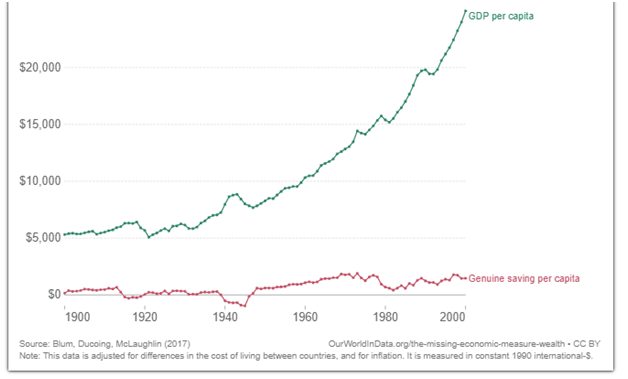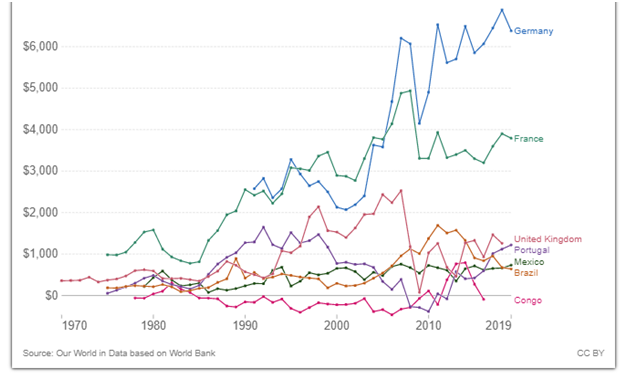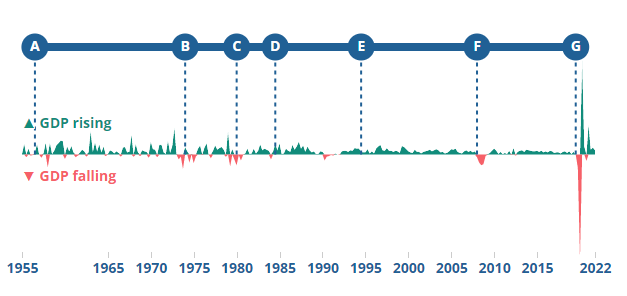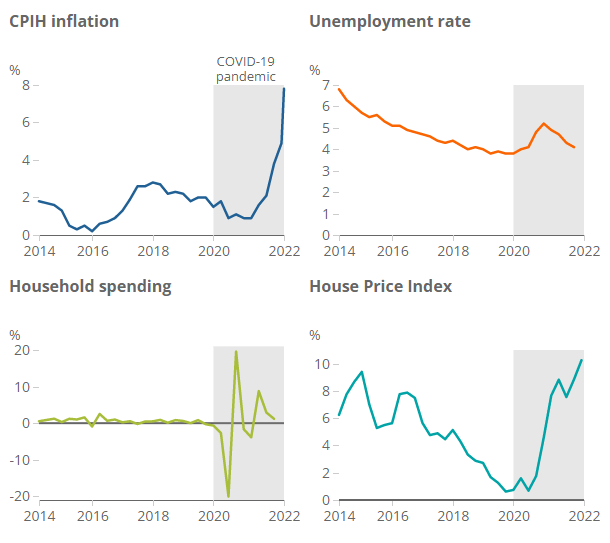Economics assignmentexplaining how is GDP an imperfect measure of the welfare of a country
Question
Task: Briefly explain in your economics assignmentwhy GDP is an imperfect measure of the welfare of a country. Outline one or more alternative measures that could be used to better represent the welfare of a country? In your country, how have GDP and the alternative measure(s) you discuss in part 2 of the question been impacted by the COVID-19 crisis? In your country, have these measures of national welfare (GDP included) returned to their pre-crisis levels (or near pre-crisis levels)? Discuss the reasons why the return to pre-crisis levels is taking/has taken the time it has in your country.
Answer
Introduction
Gross Domestic Product (GDP) is the total value of goods and services produced in a country over a period of one year. For a long time, GDP has been an important measure of the economy and is useful in a number of ways, even though there are so many things that GDP do not tell us. It is also useful in telling us the rate at which change happens in a country including the rising level of consumption. It is found in the economics assignmentthat in case of cessation in a country, GDP is able to raise the flag to mean that there high unemployment rates and the stalling of businesses is an indicator that imply hard times in an economy and loss of people’s welfare (Kapoor and Debroy, 2019). Therefore, this economics assignmentwill try and highlight further why GDP is an imperfect measure of the welfare of a country and what other alternatives are available to measure the welfare of a country. The economics assignmentwill go further to show how these measures of the economy were impacted by COVID-19 crisis and whether the economy is back to pre-crisis level.
Economics assignment explaining Why GDP is an imperfect measure of the welfare of a country
For decades, Gross Domestic Product (GDP) as per theeconomics assignment has been a real game changer that determines the economy of a country, irrespective of the views being conveyed by politicians, micro economist or the media platform. However, some of the criticism about theoretical use of GDP per head was used to determine the welfare and the progress of a given country which later led to the introduction of other alternative forms (Bergh and Antal, 2014). It is found in the economics assignmentthat even though, there was heated conversation about the criticism of the mechanism of GDP in the early 1960s, it emerged more in the 20th century from the most respected economist including the Nobel Laureates which led to the subdivision of the GDP into various categories (Thoma, 2016). In addition, in simple terms standard of living clearly spell out the GDP with respect to the Synonymous and social welfare.
As per the economics assignmentanalysis, there are critical changes in an economy that GDP do not capture accurately and might give incorrect signal to the economists. For instance, climate change has been a global problem that has raised heated debates globally. An economy can double its CO2 emission and increase pollutants locally. Both effects are harmful to the wellbeing of the population while at the same time it can mean a rising GDP figure in a country. Likewise, natural disaster is a phenomenon that can cause death and destruction of property thus require immediate emergency intervention. Despite its negative impact on the welfare of the human population, it leads to a rise in spending thus being rewarded with an increase in Gross Domestic Product figure. On the flip side of the economics assignment, the benefits achieved by a population in curbing deforestation will fail to be recognized because it might slow the rate of GDP growth.
Moreover, there is absolutely no support from the microeconomic theory on the use of GDP per capita (Bergh and Antal, 2014).In Addition, in spite of the political figure of some leaders and the journalists a big number of them utter absolutely nothing about GDP. A strong push of the GDP can be observed worldwide, as a result of being orchestrated by certain international organization like the IMF and the OECD principle of proper accounting (Banniste and Mourmouras, 2018). In as much as it deals with the market related activities, GDP is being term as the estimate of the cost.
As per the findings in the economics assignmenta good measure of the social welfare should not be confused by the good correlation of the growth of the GDP in certain periods and with the perceived progress, the perfect measure of wellbeing is not GDP; various aspects contributing to the good life tend to be excluded in the GDP example being leisure (Dynan and Sheiner, 2018). For instance as per the economics assignment, when the citizens tend to put in more effort to do work during the weekdays rather than enjoying leisure in weekends in return more goods and services will be generated and this will definitely trigger the economy hence rise in the GDP.
Accordingly, in as much there is rise in GDP this does not guarantee that all is well as the decline in the leisure would eventually offset the gain in the consuming.in particular, as outlined GDP uses market price to value the goods and services (Bergh and Antal, 2014). However, in some cases as per the economics assignmentit tends to omits some of the activities that takes place outside the market a clear example is when a chef prepares a meal in her restaurant for her family, the value of the raw material added id left out of the GDP, unlike when she prepares the same meal in her restaurant and sell it at her restaurant definitely the value of that meal will be included in the GDP (Banniste and Mourmouras, 2018). Another aspect being excluded in the GDP as per the economics assignmentis the environmental quality, as a result of the government elimination of the environmental regulation there will be rise in the GDP as there will be mass production of goods and services and not putting into consideration the pollution they expose to the environment.
Alternative measures of the Welfare of a Country
Genuine savings for investment is one alternative measure that can be used to represent the welfare of a country.As per the economics assignmentgenuine investment is a pragmatic indicator that only focuses on intertemporal issues. People tend to increase or maintain their wealth or total capital by sufficiently saving money for investment (Tzvetkova and Hepburn, 2018). Even the World Bank today has adopted the saving culture as a central indicator under an umbrella called “adjusted net savings.” If a country is not saving more as it should, then as per the economics assignmentanalysis it means that it is consuming more than it should thus putting a risk to its future prospects. Below is a chart showing genuine saving against GDP in United Kingdom from the year 1900 to 2000.

Figure 1: GDP per Capita and Genuine Saving per Capita in the UK
Source: (Tzvetkova and Hepburn, 2018)
Interestingly, it is found in theeconomics assignmentthat GDP was also tested during the World War II and the Great depression to measure the economy. Although the pioneers, Colin Clark and Simon Kuznet to bring forward an indicator that was meant to inform about the welfare of a country but the wartime took over (Tzvetkova and Hepburn, 2018). Below is a chart showing adjusted net savings per capita from the year 1970 to 2019.

Figure 2: Adjusted Net Saving per Capita
Source: (Tzvetkova and Hepburn, 2018)
The Impact of COVID-19 Crisison GDP and Genuine Saving
COVID-19 pandemic negatively affected the UK economy according to the measure obtained from the GDP at the time. As per the economics assignment research, between April 2020 and June 2020 during lockdown in UK, GDP dropped by 19.4% until summer the same year before it rebounded to 17.6%. This level of drop of GDP had not been experienced before since the ONS measurement that started in 1955. The timeline chart below shows how COVID-19 pandemic outbreak since 2019 to date led to a drastic falls in GDP.

Figure 3: The Impact of COVID-19 on GDP
Source: (Tzvetkova and Hepburn, 2018)
The lockdown measures undertaken by UK to protect the country from the spread of COVID-19 led to unpredicted drop in GDP. Public health measures including travel restrictions, closure of business, social distancing led to a drop of GDP by 19.8% between April 2020 and June 2020 (Tzvetkova and Hepburn, 2018). As per the available data in the economics assignmentHousehold spending dropped by 20% over the same period due to reduced spending in hotels, restaurants, recreation and transport (Tzvetkova and Hepburn, 2018). The graphs below show the level of reduced spending during the first quarter of COVID-19 lockdown.

Figure 4: The Level of reduced spending during the COVID-19 Pandemic Lockdown
Source: the office of National Statistics(Tzvetkova and Hepburn, 2018)
From the graphs in the economics assignment, it is evident that the consumption of products and investment in the UK decreased drastically due to the pandemic that had choked all sectors of the economy thus leading to a drop in GDP. In the first quarter of the pandemic, the unemployment rates dropped as a result of the harsh economic times that meant no money was circulating in the economy. The effect was a drop in the GDP, which only increased by 5% in the month of December 2020 (Maliszewska, Mattoo, and Van Der Mensbrugghe, 2020). The effective coronavirus self-employment income scheme and job retention scheme kept the rate of unemployment relatively low. The support scheme mentioned in theeconomics assignmenthas come out to cushion employers to the extent of paying off 12.2 million employees from the start of the pandemic in 2019 December to the end of 2020. Inflation rates reduced along with the Gross Domestic Product to 0.5% in the month of August and remained constant till the end of the year (Maliszewska, Mattoo, and Van Der Mensbrugghe, 2020). At the end of 2020, UK experienced deflationary pressure that last till the following year but inflation remained above 0% (Maliszewska, Mattoo, and Van Der Mensbrugghe, 2020). UK government then introduced new policies on health issues, fiscal and monetary expenditure that impacted the economy during the COVID-19 pandemic. The fiscal policy as per thevhelped in protecting jobs and businesses, which kept the rate of unemployment low while the monetary policies had little effect in stimulating the growth of the economy in terms of consumption and investments since lockdown measures forced people to stay at home which reduced economic activities (Wylie, 2021). The health policy had the greatest impact on health across UK. The resultant effect was the reduction in GDP and economic activities. With the introduction of vaccines and lifting lockdown measures due to the suppression of the coronavirus, the economy is slowly recovering and it is expected to boost consumption and maintain low unemployment rates in order to see a steady shift in GDP increase (Wylie, 2021).
Reasons why GDP and National Welfare has not Returned to Pre-crisis Level
From the data provided and the current situation mentioned in the economics assignment, it is important to note that the country is yet to return fully to the pre-crisis level because the economy is still grappling from the effects of the pandemic that has not only been a blow to the UK but also the other countries across the globe at large. Although the coronavirus has not yet been contained, the vaccinated population has become immune to the virus thus reducing its spread across the country. On the other hand of the economics assignment, the health sector has done a tremendous job in curbing the virus and finding new treatment methods for the mutating virus that crop up in each wave. There are high hopes that the virus will soon be contained and everything will return back to normal in the coming years.
Economics assignmentexplaining the Reasons why it is Taking Long to Return to Pre-crisis Level
Thereturn to pre-crisis levels has also taken a bit longer due to the war between Ukraine and Russia. Russia is a super power country in the world and is the third largest producer of oil behind Saudi Arabia and the United States. Therefore, as per theeconomics assignmentit means that any kind of instability in the country led to serious economic ramification that is felt across the globe. Russia oil matter coupled with the wounds of COVID-19 pandemic that is still fresh makes it difficult to propel the economy at a faster rate. This is because oil is an important commodity and if its supply is cut short or tampered with then the effects are spread to other sectors of the economy that largely depend on it. With the supply of oil being low and the demand being high, it is analyzed in theeconomics assignment that prices of not only oil but other commodities increases thus putting pressure on the citizens that are still faced with harsh economic times caused by the pandemic. This makes it hard for the economy to function as required.
Economists predict that the soaring prices, war and the colliding radical policies is a ticking bomb that the world is heading to a recession. Not to mention that UK has had two quarters of negative GDP, which means that it entered into a recession in the year 2022. It is analyzed from theeconomics assignmentthat from the pandemic to the war, returning back to the pre-crisis level at the moment will be a hurdle. The tough season is here to stay for quiet along time only if radical measures are taken in the near future, then we can be certain that things will return to normal. Before then, the country should brace for hard times ahead.
References
Banniste, G., and Mourmouras, A. 2018. Welfare Versus GDP: What Makes People Better Off. Retrieved October 22, 2022, from IMF Blog: https://www.imf.org/en/Blogs/Articles/2018/03/07/welfare-versus-gdp-what-makes-people-better-off
Dynan, K. and Sheiner, L., 2018. GDP as a measure of economic well-being (Vol. 43, p. 53). Hutchins Center Working Paper. https://www.brookings.edu/research/gdp-as-a-measure-of-economic-well-being/
Kapoor, A., and Debroy, B. 2019. GDP Is Not a Measure of Human Well-Being. Retrieved October 22, 2022, from Havard Business Review: https://hbr.org/2019/10/gdp-is-not-a-measure-of-human-well-being
Maliszewska, M., Mattoo, A. and Van Der Mensbrugghe, D., 2020. The potential impact of COVID-19 on GDP and trade: A preliminary assessment. World Bank policy research working paper, (9211). Available at SSRN: https://ssrn.com/abstract=3573211
Thoma, M. 2016. Why GDP fails as a measure of well-being. Retrieved October 22, 2022, from CBS News: https://www.cbsnews.com/news/why-gdp-fails-as-a-measure-of-well-being/
Tzvetkova, S., and Hepburn, C. 2018. The missing economic measure: Wealth. Retrieved October 22, 2022, from Our World in Data: https://ourworldindata.org/the-missing-economic-measure-wealth#:~:text=Genuine%20saving%20(also%20known%20as,eating%20into%20its%20capital%20stocks.
Van den Bergh, J. and Antal, M., 2014. Evaluating alternatives to GDP as measures of social welfare/progress (No. 56). WWWforEurope Working Paper.http://hdl.handle.net/10419/125713
Wylie, E., 2021. The Impact of Covid-19 and the Lockdown on the UK
Economy.https://scholarship.rollins.edu/honors/147












